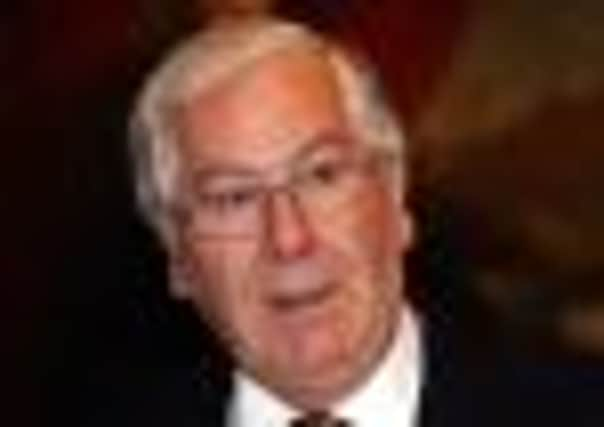Mervyn King defends Bank in ‘choppy’ times


In his latest inflation report, the Bank’s Governor predicted the economy would “zig-zag” in and out of growth this year and warned there was “no easy remedy” to the problems facing the country.
He stood by previous forecasts for low growth and falling inflation but suggested a “double-dip” recession in the UK was less likely than previously thought.
Advertisement
Hide AdAdvertisement
Hide AdThe Bank also hinted that interest rates would remain at their record low of 0.5 per cent until 2014, bringing good news for borrowers but continued frustration for savers.
Sir Mervyn said he had “deep sympathy” with savers who were receiving meagre returns through no fault of their own, but he claimed raising rates would only do more damage to the economy.
He denied suggestions that the Bank was giving the impression saving was not worthwhile, saying: “No, we’re not sending out any such message at all and indeed you can see that households believe that it is, because their savings have gone up, not gone down.
“One of the reasons for slow growth in the last year was weakness of consumer spending and higher savings by households.
Advertisement
Hide AdAdvertisement
Hide Ad“I have deep sympathy with those who, totally unconnected with the origins of this crisis, suddenly find that the returns on their savings have reached, as I said, negligible levels.”
The Bank expects growth to rise from about one per cent this year to 1.8 per cent in 2013, while inflation will fall to its two per cent target in the final quarter of 2012 – a level it has not reached for more than two years.
Sir Mervyn said: “We can take some reassurance from the fact that inflation is now falling. But we are steering a course through choppy waters, and many people are experiencing difficult times.”
He warned that “substantial headwinds” would hamper recovery, but insisted the economy was moving in the right direction because it had a plan in place to tackle the country’s debt and had devalued the pound without triggering a rise in wages.
Advertisement
Hide AdAdvertisement
Hide AdA key tactic has been to effectively print more money – quantitative easing (QE) – with £325bn having been injected into the economy since the programme began in March 2009.
Sir Mervyn said the UK would have suffered a much deeper recession had the Bank raised interest rates to hit its inflation target.
He dismissed as “foolish” suggestions that the Bank’s Monetary Policy Committee (MPC) should be offered bonuses or cash incentives to meet the two per cent mark.
“We’re here for public service and we gain or lose our reputation by either hitting or missing the target,” he said.
Advertisement
Hide AdAdvertisement
Hide AdSir Mervyn said constructive feedback was required to ensure the MPC had the right incentives to do its job.
“Rather than mess around with arbitrary financial rewards, which would always be pointless in my view and controversial and certainly would have no effect on the effort we put into our jobs, we need a proper debate,” he added.
The Bank raised its long-held concerns over the threat of the eurozone debt crisis, warning that reforms required to deal with those concerns would themselves weigh on growth.
Some economists, including David Kern at the British Chambers of Commerce, believed the report was too optimistic.
Advertisement
Hide AdAdvertisement
Hide Ad“While we agree that growth will gradually strengthen from the middle of 2012 onwards,” Mr Kern said, “the pace of improvement is likely to prove slower than the report predicts.”
Howard Archer, chief UK and European economist for IHS Global Insight, said it was safe to assume that interest rates would not move from 0.5 per cent for “some considerable time to come”.
He predicted that further QE was “more likely than not”, with the economy on course to “flatline” during the first half of the year before picking up gradually in the second half.
Simon Rose, spokesman for campaign group Save Our Savers, said that the harmful effects on people’s savings were undermining investment and growth.
“Prolonged low interest rates are a terrible thing,” Mr Rose added. “Savers are angry and they are dismayed.”
Comment: Page 12.